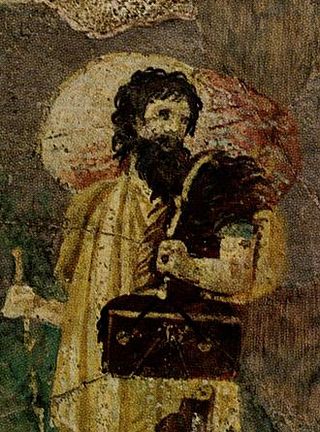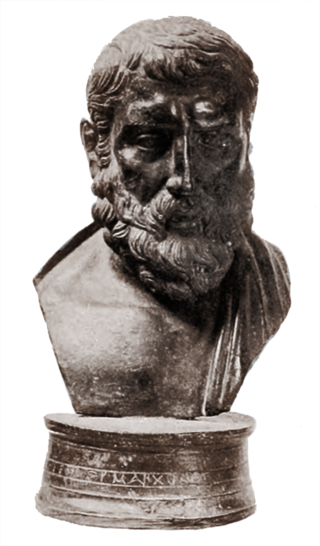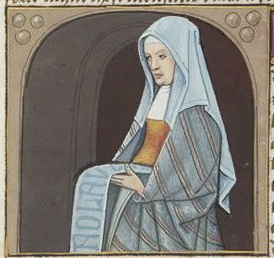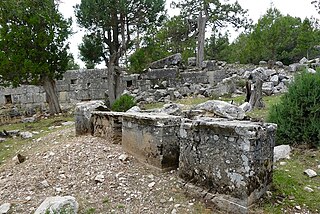Batis (or Bates) of Lampsacus, was a student of Epicurus at Lampsacus in the early 3rd century BC. According to Diogenes Laertius, she was the sister of Metrodorus and wife of Idomeneus. [1]
Seneca the Younger recounts that when Batis' son died, Metrodorus wrote a letter to his sister offering comfort, [2] telling her that "all the Good of mortals is mortal," [2] and "that there is a certain pleasure akin to sadness, and that one should give chase thereto at such times as these." [3] Fragments of a letter from Epicurus to Batis on the death of Metrodorus in 277 BC have also been discovered among the papyri at Herculaneum. [4] Some of the other fragments may have been written by Batis. [5]
Anaxarchus was a Greek philosopher of the school of Democritus. Together with Pyrrho, he accompanied Alexander the Great into Asia. The reports of his philosophical views suggest that he was a forerunner of the Greek skeptics.

Epicurus was an ancient Greek philosopher and sage who founded Epicureanism, a highly influential school of philosophy. He was born on the Greek island of Samos to Athenian parents. Influenced by Democritus, Aristippus, Pyrrho, and possibly the Cynics, he turned against the Platonism of his day and established his own school, known as "the Garden", in Athens. Epicurus and his followers were known for eating simple meals and discussing a wide range of philosophical subjects. He openly allowed women and slaves to join the school as a matter of policy. Of the over 300 works said to have been written by Epicurus about various subjects, the vast majority have been destroyed. Only three letters written by him—the letters to Menoeceus, Pythocles, and Herodotus—and two collections of quotes—the Principal Doctrines and the Vatican Sayings—have survived intact, along with a few fragments of his other writings. As a result of his work's destruction, most knowledge about his philosophy is due to later authors, particularly the biographer Diogenes Laërtius, the Epicurean Roman poet Lucretius and the Epicurean philosopher Philodemus, and with hostile but largely accurate accounts by the Pyrrhonist philosopher Sextus Empiricus, and the Academic Skeptic and statesman Cicero.

Epicureanism is a system of philosophy founded around 307 BC based upon the teachings of the ancient Greek philosopher Epicurus.

Crates of Thebes was a Greek Cynic philosopher, the principal pupil of Diogenes of Sinope and the husband of Hipparchia of Maroneia who lived in the same manner as him. Crates gave away his money to live a life of poverty on the streets of Athens. Respected by the people of Athens, he is remembered for being the teacher of Zeno of Citium, the founder of Stoicism. Various fragments of Crates' teachings survive, including his description of the ideal Cynic state.

Metrodorus of Lampsacus was a Greek philosopher of the Epicurean school. Although one of the four major proponents of Epicureanism, only fragments of his works remain. A Metrodorus bust was found in Velia, slightly different modeled to depict Parmenides.
Polyaenus of Lampsacus, also spelled Polyenus, was an ancient Greek mathematician and a friend of Epicurus.

Timon of Phlius was an Ancient Greek philosopher from the Hellenistic period, who was the student of Pyrrho. Unlike Pyrrho, who wrote nothing, Timon wrote satirical philosophical poetry called Silloi (Σίλλοι) as well as a number of prose writings. Unfortunately, these have been lost, but the fragments quoted in later authors allow a rough outline of his philosophy to be reconstructed.

Lampsacus was an ancient Greek city strategically located on the eastern side of the Hellespont in the northern Troad. An inhabitant of Lampsacus was called a Lampsacene. The name has been transmitted in the nearby modern town of Lapseki.
Idomeneus of Lampsacus was a friend and disciple of Epicurus.

Hermarchus or Hermarch, sometimes incorrectly written Hermachus, was an Epicurean philosopher. He was the disciple and successor of Epicurus as head of the school. None of his writings survives. He wrote works directed against Plato, Aristotle, and Empedocles. A fragment from his Against Empedocles, preserved by Porphyry, discusses the need for law in society. His views on the nature of the gods are quoted by Philodemus.

Leontion was a Greek Epicurean philosopher.

Diogenes of Oenoanda was an Epicurean Greek from the 2nd century AD who carved a summary of the philosophy of Epicurus onto a portico wall in the ancient Greek city of Oenoanda in Lycia. The surviving fragments of the wall, originally extended about 80 meters, form an important source of Epicurean philosophy. The inscription, written in Greek, sets out Epicurus' teachings on physics, epistemology, and ethics. It was originally about 25,000 words long and filled 260 square meters of wall space. Less than a third of it has been recovered.
Metrodorus of Chios was a Greek philosopher, belonging to the school of Democritus, and an important forerunner of Epicurus.
Metrodorus of Lampsacus was a Pre-Socratic philosopher from the Greek town of Lampsacus on the eastern shore of the Hellespont. He was a contemporary and friend of Anaxagoras. He wrote on Homer, the leading feature of his system of interpretation being that the deities and stories in Homer were to be understood as allegorical modes of representing physical powers and phenomena. He is mentioned in Plato's dialogue Ion. He died in 464 BC.
This page is a list of topics in ancient philosophy.
Themista of Lampsacus, the wife of Leonteus, was a student of Epicurus, early in the 3rd century BC. Epicurus' school was unusual in the 3rd century, in that it allowed women to attend, and we also hear of Leontion attending Epicurus' school around the same time. Cicero ridicules Epicurus for writing "countless volumes in praise of Themista," instead of more worthy men such as Miltiades, Themistocles or Epaminondas. Themista and Leonteus named their son Epicurus.
Leonteus of Lampsacus was a pupil of Epicurus early in the 3rd century BCE. He was the husband of Themista, who also attended Epicurus' school. Such was the esteem in which they held Epicurus that they named their son after him.
Timocrates of Lampsacus was a renegade Epicurean who made it his life's mission to spread slander about Epicurus' philosophy and way of life. He was the elder brother of Metrodorus, Epicurus' best friend and most loyal follower, who was born in Lampsacus in the late 4th century BC. He studied with his brother in the school of Epicurus, but some time c. 290 BC, he broke with the school, apparently because he refused to accept that pleasure was the supreme good of life. The dispute became quite bitter; Philodemus quotes Timocrates saying "that he both loved his brother as no one else did and hated him as no one else." In a much quoted letter, Metrodorus, in exaggerated fashion, took Timocrates to task for not making the stomach the standard in everything relating to the prime good. Metrodorus wrote at least one work against Timocrates; and Epicurus also wrote an Opinions on the Passions, against Timocrates. In response, Timocrates wrote a polemic against Epicurus, whereby he claimed that Epicurus was not a genuine Athenian citizen, and that he was slovenly, weak, ignorant, rude, and vomited twice a day from overindulgence. His book against Epicurus, published after his apostasy, was entitled Delights (euphranta).
Pasicles of Thebes was a Greek philosopher and brother of the Cynic philosopher Crates of Thebes. He attended the lectures of his brother Crates, but he is otherwise connected with the Megarian school of philosophy, because Diogenes Laërtius calls him a pupil of Euclid of Megara, and the Suda calls him a pupil of an unknown "Dioclides the Megarian." Pasicles is said to have been the teacher of Stilpo, who became leader of the Megarian school. Thus we have the implausible situation of Pasicles teaching Stilpo, Stilpo teaching Crates, and Crates teaching Pasicles. Crates named his son Pasicles.
Amynomachus, son of Philocrates, from the Attic deme of Bate was, together with Timocrates son of Demetrius from Potamos, the heir of Epicurus. Whether they were Epicurean philosophers themselves is uncertain. Epicurus' property was given to them on condition that they give the Garden to Hermarchus and the other Epicureans. In this way Epicurus an Athenian citizen, ensures that Hermarchus and other non-Athenian Epicureans could remain in the Garden, although they cannot inherit legally the property.